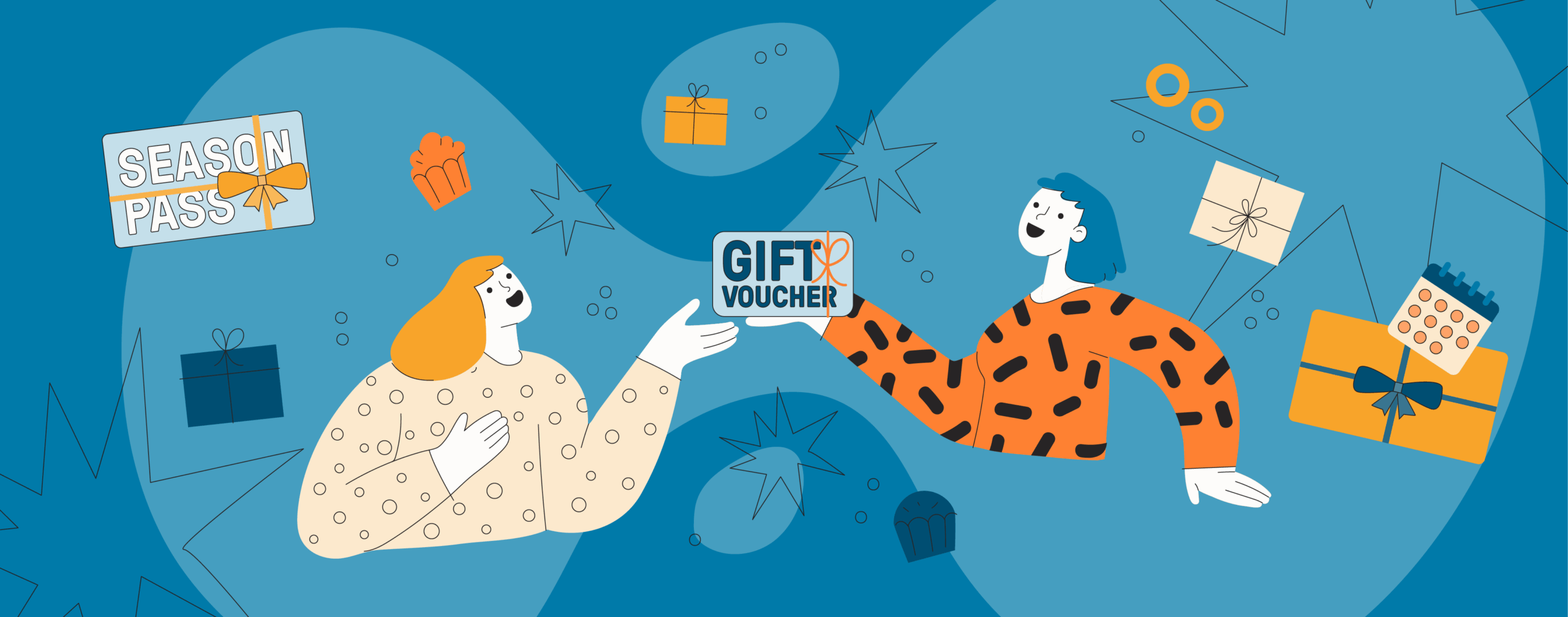7 best practice examples for tour and activity providers during times of crisis
Tips & Advice
The corona crisis has brought global tourism to a standstill and it will take some time before the sales figures of 2019 can be reached again. The lockdown will not last forever and, in the meantime, attractions and leisure activities in Europe are slowly starting to reopen their doors to visitors again. Some operators still have to wait for their opportunity to re-open. Those who have already been allowed to resume business can only do so if certain capacity limits and hygiene regulations are observed.
However, the latest news from the industry has shown us that, in addition to all the setbacks and bad news that the global lockdown has brought to the tourism sector, tour and leisure providers demonstrate how quickly and flexibly the industry is responding to new challenges.
It is not yet certain when major events, especially indoor events, will be allowed to take place again. Even on a smaller scale, it remains questionable as to when normal business operations will be able to resume. In this phase, it is more important than ever to look further on the horizon. There are many opportunities for providers of tours, activities and leisure experiences to revive their business.
In recent weeks we have been in constant contact with our customers and our entire industry network, in order to summarize the best practice examples of Corona strategies for you in this article. They should help you to find an individual solution for you, because despite the currently still prevailing ban on contact, it is still possible to generate sales now and plan for the future. And the best thing is that these strategies are proving their worth not only in this specific crisis. You can use them in your day-to-day business as well as in other crisis situations.
Here are for tour and activity providers during times of crisis:
Best practice example 1: Vouchers can save your business
One strategy has proved particularly successful across all sectors of the industry. Whether you are a provider of boat tours, cooking courses or run an escape room – vouchers have proven to help all providers, especially during the lockdown. Although tours could not be offered, dreaming about them and buying them in advance was nonetheless still possible, and helped some providers weather the storm. People want something to look forward to, especially when redemption dates are flexible.
The providers we spoke to are particularly keen to make their voucher offers highly visible. Directly and prominently featured on their homepage, potential customers get all the important information about the current promotions and find out at a glance why they should buy vouchers right now. In our example from Virtual Lounge aus Braunschweig. The action description is followed by a colour-coded button with a clear request to buy. After clicking on the button, you are taken directly to the overview of all offers and can book immediately.
Virtual Lounge aus Braunschweig
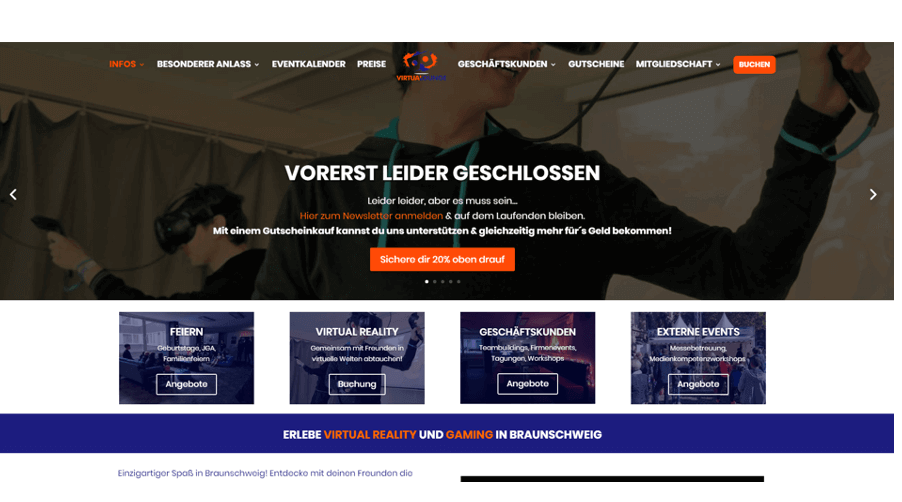
(Image source: https://www.virtualounge.de/buchen/)
Vouchers are a great way to bring in revenue quickly, well before the goods or services in question are actually delivered. Just as a tip: especially now during the crisis, it has proven fruitful to make vouchers open ended (i.e. to be redeemed any date in the future). If your customers have the opportunity to redeem them next year, this creates more confidence when making purchases. As it is not yet clear whether some regions or countries will be forced to reinforce stricter regulations, thus further reducing the window during which the voucher can be redeemed. In our example of “Heikes Werkstatt” it is explicitly pointed out that the exact date of the jewellery workshops can be added later.
Heikes Werkstatt
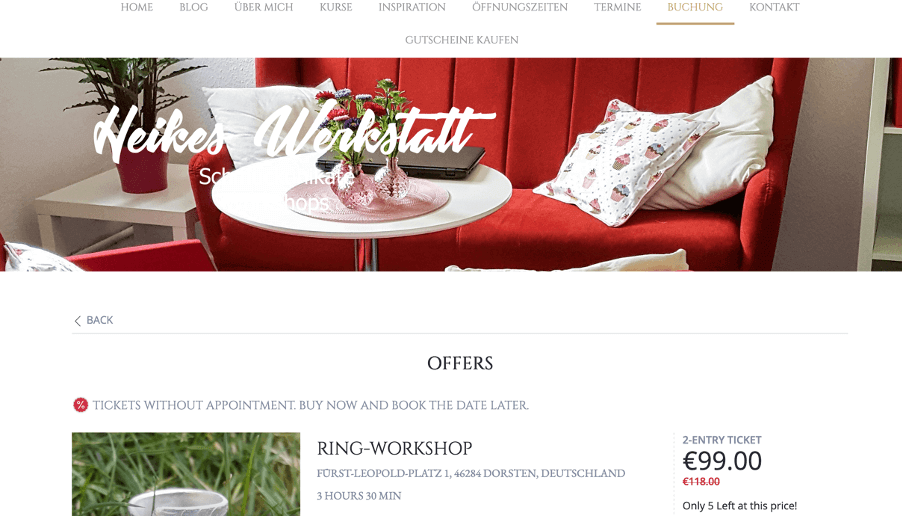
(Image source: https://www.heikes-werkstatt.de/)
Although attractions and leisure activities were still closed in April and no date was set for reopening, the switch to voucher-only sales ensured that sales increased within a few days. This booking overview from one of our customers shows you how quickly business can recover.

The best thing about voucher sales is that it does not only work in times of crisis. Selling vouchers ensures that your leisure activity becomes the perfect gift for every season and occasion. Find out more here.
Best practice example 2: Share special offers with your customers
Vouchers grant your customers the possibility to support you during this crisis period and help you to continue generating sales. But the tourism industry is not the only one affected, and many customers are facing similar financial challenges as you. This makes it all the more important that you create incentives to buy and thus meet your customers’ needs. In our second best-practice example, we will show you how bookingkit users are generating more sales with buy-one-get-one-free offers.
The world-famous Dalí exhibition in Berlin started back in March with a 2-for-1 promotion, in which customers may purchase two vouchers for the price of one. Or they could also simply donate to the organization. It was promoted via newsletter and featured prominently on their home page.
Dalí exhibition
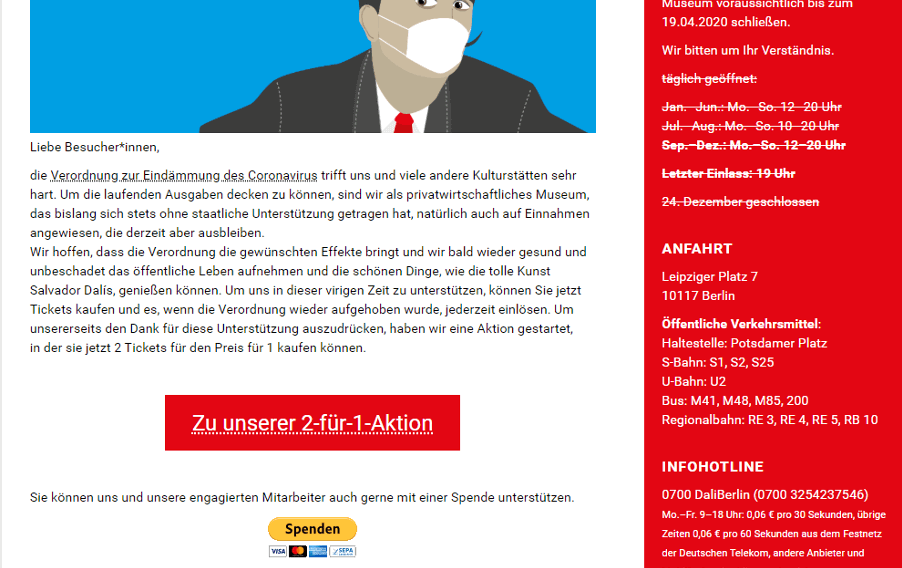
(Image source: https://www.daliberlin.de/de)
The online provider of culinary city tours “Taste The Town” is also relying on vouchers with buy-one-get-one-free offers in this time of crisis, offering 4 tickets for the price of 3.
Taste The Town
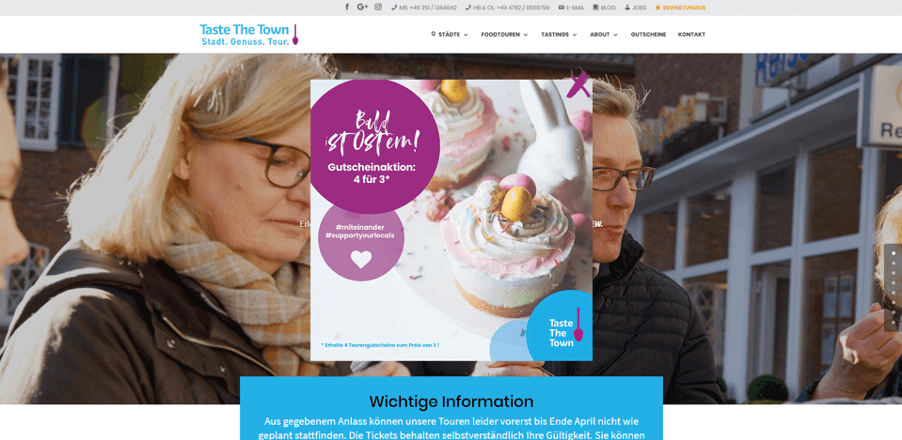
(Image source: https://tastethetown.de/)
With bookingkit the creation of these offers is very easy and works with flexible tickets. In this article you will learn how to do this.
Best practice example 3: Offer discounts
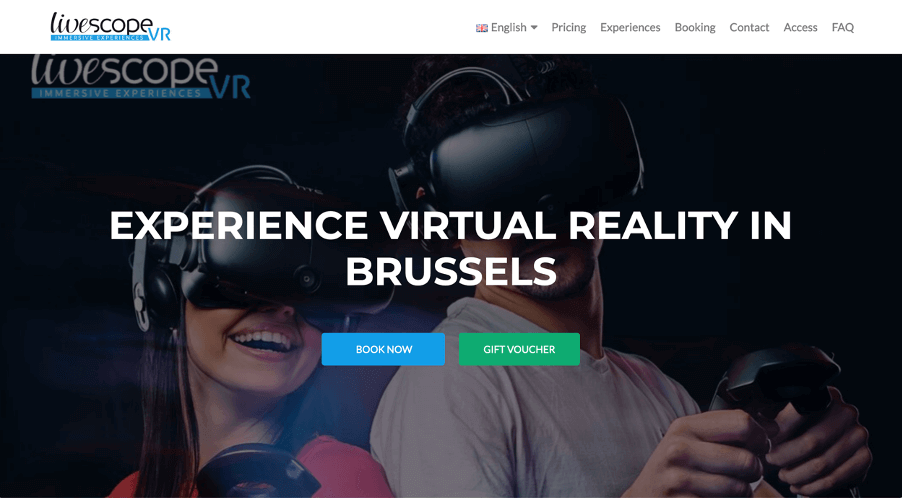
(Image source: https://www.livescope.be/en/)
Other providers of leisure activities rely on discounts on every ticket purchased instead of get-one-free offers. “Livescope VR” from Brussels offers its customers a 20% discount. The code “BACKTONORMAL” is used for this, which is entered by the customer on the booking page. Combined with vouchers, this is the perfect incentive to buy and at the same time a call for support for the company. You can find out more about generating vouchers here.
Best practice example 4: Create new products
Perhaps the most creative strategy we have seen is the development of completely new products that are now expanding the portfolio of leisure providers. “Dresden Secrets” operates an escape room in the Saxon metropolis. During the crisis, the company offers a mobile indoor escape game. Players can easily order the puzzle fun for themselves at home without having to leave their own four walls. It is precisely these ideas that can be marketed on the company’s own website even beyond the time of the Corona crisis and as a gift offer a long-lasting opportunity for additional sales.
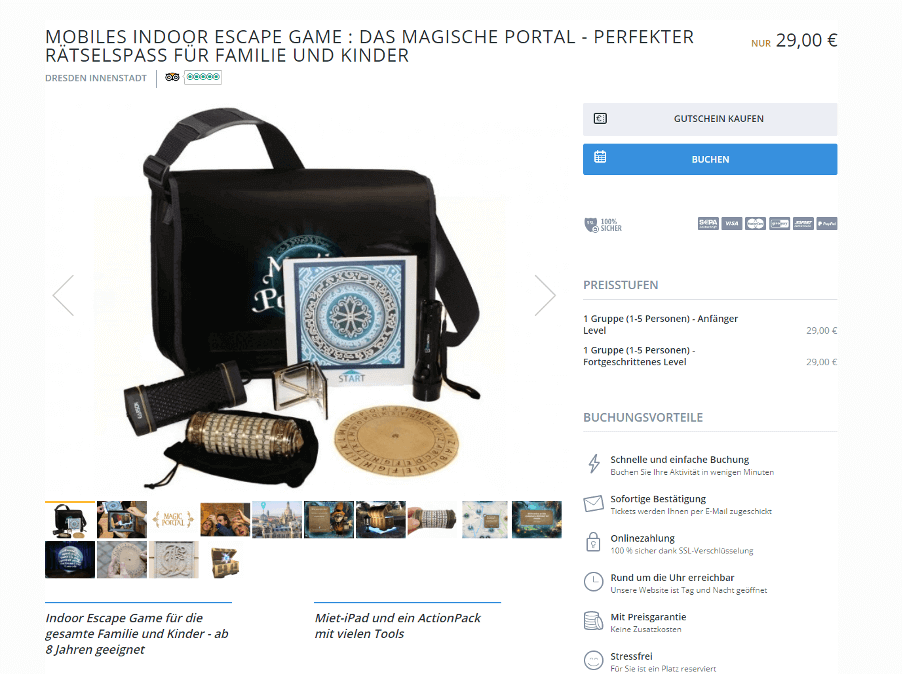
(Image source: https://exit-game.de/berlin/buchen/)
Not all leisure experiences can be so easily converted into a new product that can be sent to customers. For this reason, the Berlin escape room provider “EXIT®” has put together a care package for its customers that includes a voucher, an adventure book and several merchandise items from the company. So while customers are buying a voucher that they may not be able to redeem until much later, they are immediately sent a nice care package of equivalent value for their booking. Exciting merchandise is an easy way to make additional sales – both during the online booking process and afterwards.
EXIT®
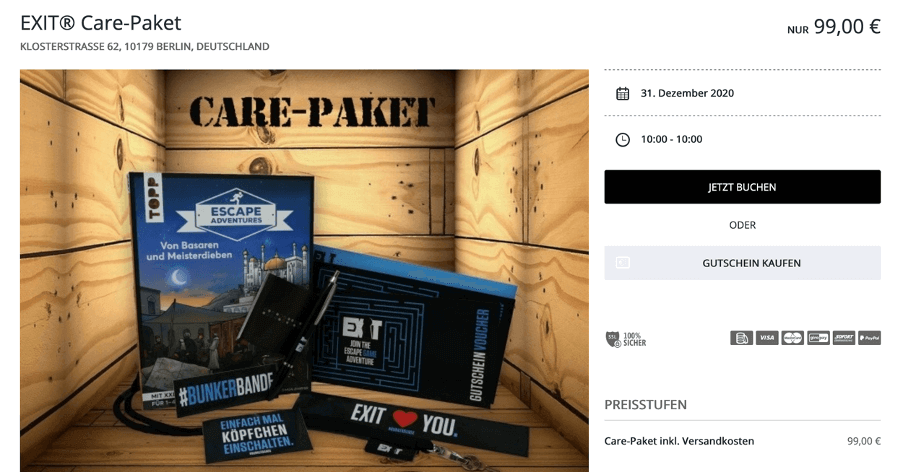
(Image source: https://exit-game.de/berlin/help/)
Best practice example 5: The world becomes a village again – focus on local customers
How long it will take global tourism to fully recover is not yet foreseeable.
Slowly, attractions and leisure experiences are reopening. However, as we know some national borders are still closed and air traffic is restricted. We can safely assume it will take some time before you can count on international guests again . Domestic tourism will therefore become much more important this year, as within a country the travel restrictions will be the first to be lifted.
All the more reason to focus first on the customers who are close to you. “Wurstgefühle” is one of the best examples of this. Usually the company offers courses and workshops where participants are taught how to produce sausage. During the crisis, the Mainz-based company started a delivery service for bratwursts within a 10-kilometer radius and relied on the support of its immediate neighbors.
While they have simply added a range of products to their portfolio, “Wurstgefühle” is at the same time marketing the actual course offering.
Wurstgefühle
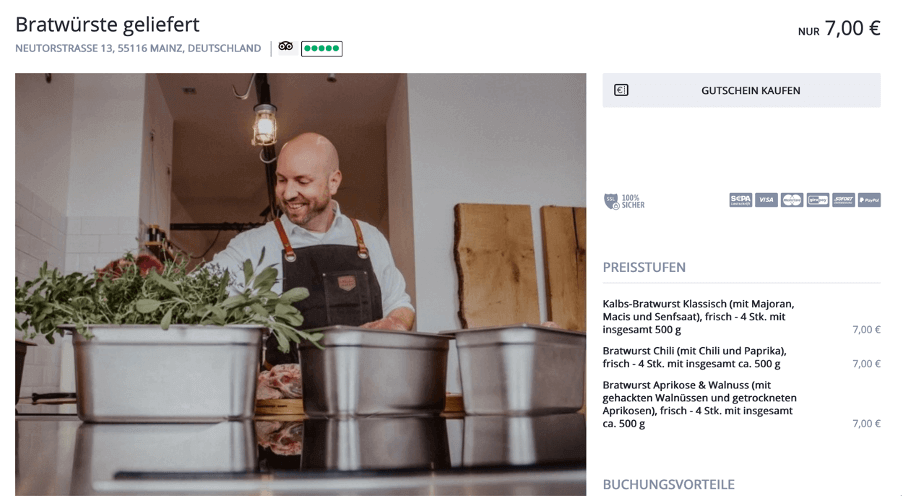
(Image source: https://www.wurstgefuehle.de/)
Best practice example 6: From offline to online
As a sixth example, we recommend the digitalisation of your offer. The sports studio “Vitalastic” from Leipzig offers online training during the crisis. They take place in the form of a video conference and the participants are instructed via live video from the studio. Especially in the area of workshops, further education and training, the offer of online solutions is becoming more and more important. Even once the lockdown is lifted, the digital transfer of knowledge represents a serious alternative to on-site possibilities.
The biggest advantage is that the number of participants no longer depends on the size of your location, or other physical resources. Within a single training or a one-time production of a workshop video you can not only reach an unlimited number of participants simultaneously. However, the recordings of the videos can also be made available to after the fact. This way you reduce your workload and reach more customers at the same time.
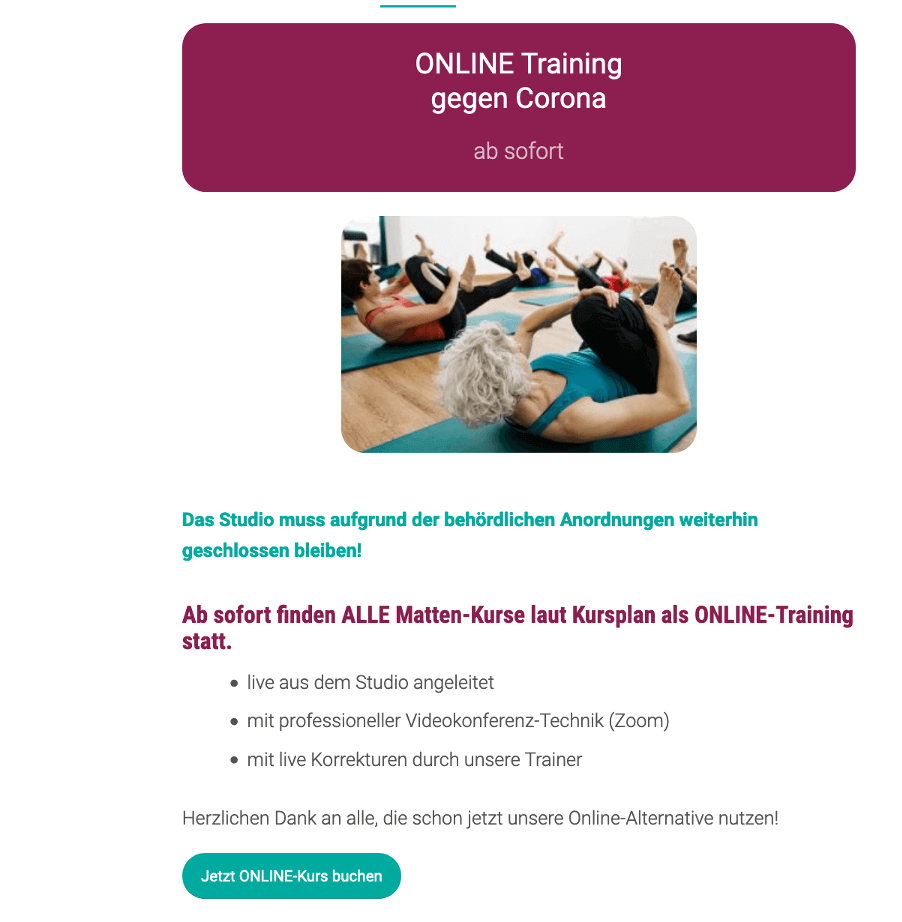
(Image source: https://vitalastic.de/)
Another example is our vendor “Geheimgang“, with its browser-based online escape game “Sherlock Down”. This is a classic point-and-click adventure game where you can experience the puzzle fun for up to 6 people at home. At the same time, the Swiss company offers donation vouchers in its shop to support the company.
Geheimgang
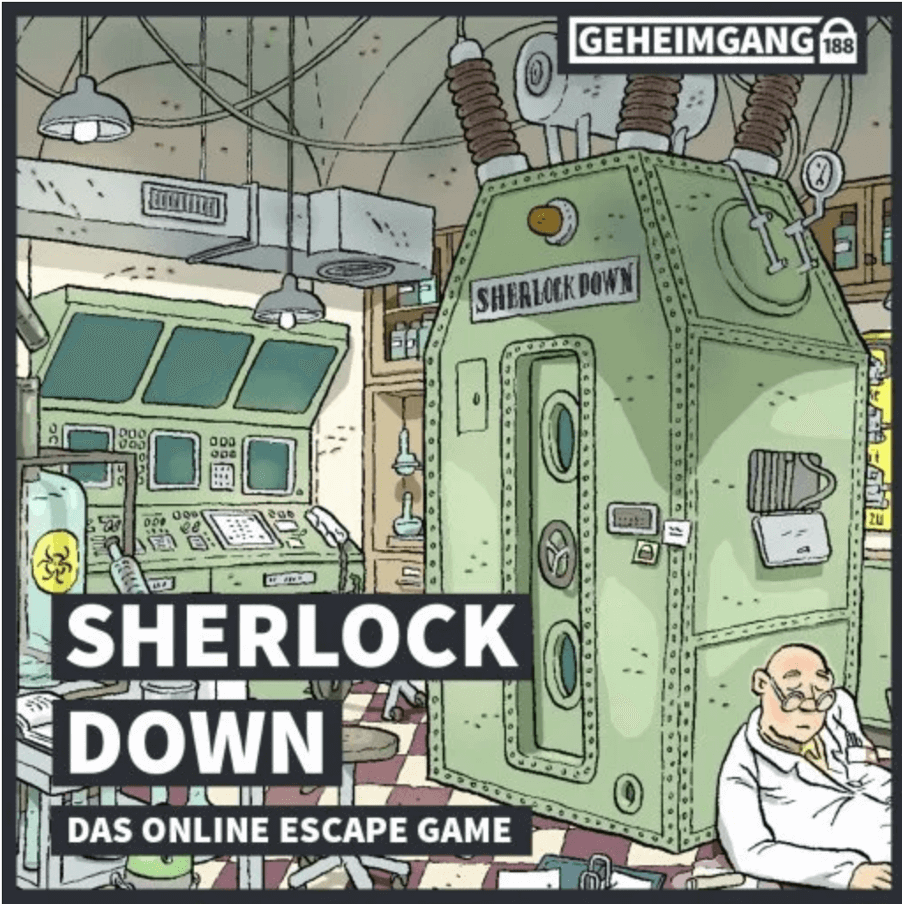
(Image source: https://geheimgang.ch/sherlock-down/)
Best practice strategy 7: The “Hygiene factor”
An important question you should ask yourself is: Who are the people who will be my customers after the crisis? That sounds a bit drastic, but it’s worth thinking about. Once the initial restrictions have been lifted, people will want to actively go out and enjoy their lives again, albeit with an increased awareness of hygiene and security measures. In order to strengthen the trust in your company, you should already now think of a good concept that works and about which your customers can find out everything at any time.
The most important thing is that you can actually implement this concept. So don’t go greenwashing and actually apply your new hygiene standards. This will also help you to reopen your business more quickly. What can be observed very clearly is that the gradual easing of contact and curfew restrictions is linked to strict conditions, such as in shops and markets. The observance of social distance providing disinfectants are two of the most important hygiene measures you should prepare for. As a provider of canoe tours, our customer “backstagetourism” from Berlin was thus able to reopen its shop under conditions already at Easter.
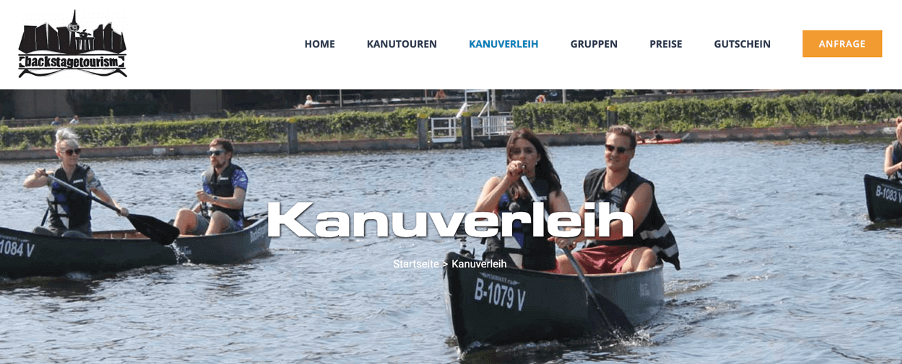
(Image source: https://backstagetourism.com/kanuverleih-berlin/)
Which measures you can take to make your reopening a success and how bookingkit helps you with a smooth restart, we have summarized in an article for you.
Conclusion: What we have learned from the crisis so far
Although countries across the globe have been affected in very different ways and reopening steps are very individual to each country or region, there are some trends that can be seen across all national borders.
Our advice:
- Domestic tourism will be possible again much before international tourism. So it will be all the more important to target customers from your region and your country with your offers.
- There is no way around online offers anymore. No matter what you offer your customers: In the future, they will book leisure experiences online from the comfort of their own homes even more often. A trend that has been emerging for years and has been further strengthened by the crisis. The contactless reservation and booking of your offers has advantages not only for your customers but also for you. With the right booking software the reach of your business increases and through automated processes. Then you can concentrate fully on your offer with minimal administrative effort.
- The tours, activities and attractions industry is becoming more complex. Our best-practice examples show how flexibly providers in the tourism industry react to new challenges. In just a few weeks, they were able to implement what might have been a process lasting years had it not been prompted by the COVID-19 crisis.
To provide you with even more best practice examples and industry insights, we have created our bookingkit Facebook Community. Get new information first and share your strategies and actions with other vendors, OTAs and partners.





